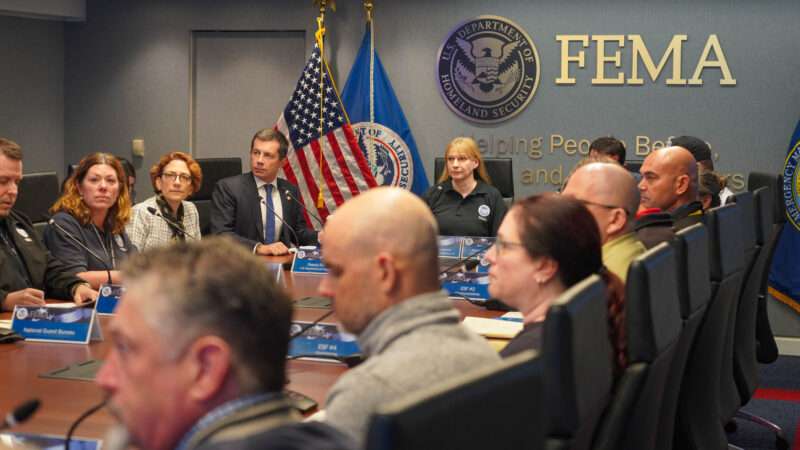
"The $750 emergency check is not a loan." "The Biden-Harris administration is not withholding support from counties that voted for Trump." "FEMA is not out of money." "FEMA didn't spend disaster funds housing illegal immigrants."
Before the waters of Hurricane Helene receded, the Federal Emergency Management Agency (FEMA) sprang into action to carry out a crisis P.R. campaign—alongside some emergency response work.
Many of the overwrought claims the agency sought to debunk could be traced to the fact that the storm struck a month before a highly contested presidential election. Donald Trump's campaign sought to make federal mismanagement—of the hurricane, of the budget, and of the border—part of his case against Vice President Kamala Harris.
While most of his specific charges against FEMA's handling of Helene were clumsy and easily refutable, they proved oddly sticky in the news cycle and on social media. Why? Because FEMA has given Americans every reason to believe it is highly politicized, a poor steward of federal resources, bad at establishing priorities, and often unable to communicate clearly to people in distress.
Since it was created in an act of bureaucratic centralization in 1979, FEMA has done little to earn Americans' trust and much to earn their suspicion and scorn. The agency's track record over the last 20 years is a case study in bureaucratic mismanagement, with repeated highly public failures.
The most infamous example remains its response to Hurricane Katrina in 2005, where delays, miscommunication, and logistical chaos left thousands of people stranded without basic necessities for days. In the immediate aftermath of the storm, FEMA turned back official convoys with supplies due to paperwork snafus and refused to cooperate with outside organizations despite being overwhelmed and underprepared.
No wonder, then, that when rumors began to circulate that federal authorities were interfering with local and private rescue and aid efforts after Hurricane Helene, the general public found them believable. Citizens once again stepped up, with private aircraft and smaller airports delivering aid after roads to Asheville, North Carolina, washed out.
"There was such a sense of urgency and purpose," said Morty Lloyd of the Aircraft Owners and Pilots Association. Lloyd, who led a flight of three aircraft carrying supplies, was describing the scene at the airport on the group's website. "No one was walking on the ramp. Everyone was running."
Elon Musk, who was helping to deploy Starlink to the area to restore internet access, relayed rumors that the feds were preventing helicopters and other vehicles from helping people in severely damaged areas. While Musk has an itchy trigger finger for unsubstantiated retweets, Secretary of Transportation Pete Buttigieg denied the allegations with enough weasel words (the Federal Aviation Administration "doesn't block legitimate rescue and recovery flights," he tweeted, leaving "legitimate" undefined) to make his reassurances useless in the face of historical patterns.
FEMA's inadequacies were exposed again in 2012 during Hurricane Sandy. While power companies worked to restore electricity across New York and New Jersey, FEMA's coordination efforts fell short. Residents in the hardest-hit areas faced weeks without power, and the agency's support in establishing shelters or providing backup generators was limited and poorly executed. In Staten Island and other communities, local volunteers and private organizations ended up filling the gaps, providing essential services that FEMA failed to deliver.
FEMA fared no better during Donald Trump's presidency. Though Trump later declared his—and FEMA's—performance during Hurricane Maria in 2017 to be "tremendous…an incredible, unsung success," Puerto Ricans went months without power, struggled with delayed aid, and ultimately suffered a death toll of over 3,000. A single, genuinely awful song by Lin-Manuel Miranda ("Almost Like Praying") managed to generate $3 million to help the island with impressive speed and responsiveness (alongside many other, less aesthetically offensive, charitable efforts totaling about $1 billion). Meanwhile FEMA struggled to distribute tarps, shipments got stuck in warehouses, and locals complained about the agency's siloed and duplicative efforts. Contracting for rebuilding was plagued by corruption, including an infamous $156 million electrical grid repair contract awarded to a small Montana company, Whitefish Energy. The company had only two full-time employees at the time of the award.
And unlike Biden, Trump did divert some funds appropriated for disaster response to immigration-related spending. In 2019, he "reprogrammed" FEMA funds to go to Immigration and Customs Enforcement facilities.
After Joe Biden became president, Hurricane Ida saw FEMA-exacerbated fuel shortages across Louisiana. And when Hurricane Fiona hit Puerto Rico again in 2022, the island was once again plunged into blackout and another two dozen deaths were added to the storms' toll.
For the most part, FEMA's failings are not the doing of any president or party. They are deep in the fundamental nature of the self-perpetuating, turf-defending, hyper-bureaucratic agency itself. FEMA has more than 22,000 employees; nearly all are people of goodwill with real knowledge about disaster response. But delivering expertise wrapped in red tape to people whose scissors washed away in a flood is hardly better than no help at all.
In this special issue of Reason, we offer up an idiosyncratic list of federal agencies and departments we think Americans would be better off without. Surprisingly, when we were initially planning the issue, no one picked FEMA. But as recent events have revealed, that was an oversight—even in such a target-rich environment.
As we go to press, Hurricane Milton is about to make landfall in Florida. FEMA recently announced that only 9 percent of its personnel are available to be deployed for emergency response. We can't know what will happen with the weather. We don't know what will happen with the election. But we can be confident that FEMA simply doesn't have the wherewithal to meet the moment. It has lost the trust of the American people. It's time to abolish FEMA.
The post Abolish FEMA appeared first on Reason.com.







